Shelley Winters @ 100: Bloody Mama (1970)
 Monday, August 17, 2020 at 3:25PM
Monday, August 17, 2020 at 3:25PM We're celebrating the centennial of Shelley Winters. Here's Cláudio Alves…
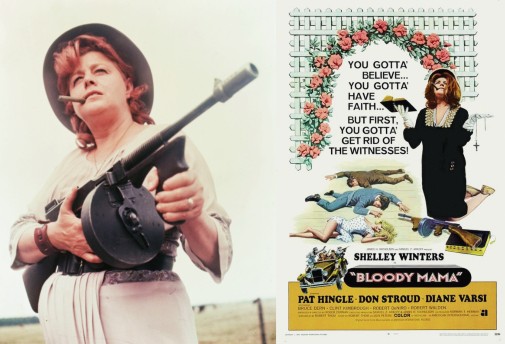
In October 1966, less than six months after her second Best Supporting Actress Oscar win, Shelley Winters appeared in two episodes of the Batman TV show. Winters once again played a villainous mother. Unlike most Batman villains though, Winters' Ma Parker wasn't based on a comic book character but a historical figure. Kate Barker, commonly known as Ma Barker, was the matriarch of a criminal family who terrorized Arizona during the first decades of the 20th century. Boisterous, vicious, merciless, and bad to the bone, this monster mother was, in many ways, a perfect role for Shelley Winters in this period of her career.
It's no wonder then, that four years after the Batman episodes had aired, Winters returned to the iconic part. This time, however, there were no euphemisms or layers of superhero camp between the actress and the character. Roger Corman's Bloody Mama is a biopic of Ma Barker that, more or less, follows the historical narrative. That being said, if you think this is any sort of stuffy Oscar baity prestige picture, you are terribly mistaken...
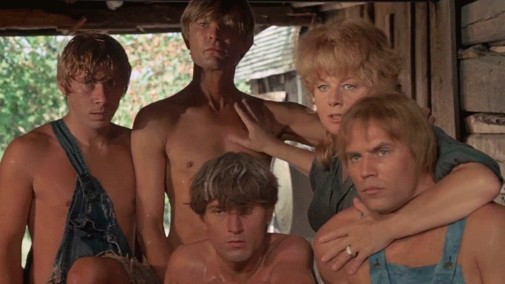
Like a lot of Corman productions, Bloody Mama is a small-budget indie with pretensions of an exploitation cult-following. This is obvious from the first scene, which dramatizes the rape of young Kate Barker by her father and older brothers. It's a shameless way to start the movie, one that shocks and provokes, especially when considering that the flick featured a two-time Oscar-winning actress in the titular role. Any expectation of middlebrow drama is shot, killed, and buried immediately, and the subsequent few scenes after the credits aren't any gentler on the spectator. Flashing forward some decades, Corman finds Barker as the mother of four adult sons whom she bathes like babes and uses to satisfy her sexual appetites.
All that being said, it'd be wrong to characterize Corman's approach as a mere provocation. While the entertaining value of these vile scenarios played in outrageous style is difficult to deny, one quickly sees that the director is looking for something deeper than Grand Guignol. The victimization of young Kate Barker becomes a means for the audience to understand the behavior of her adult self. It's a Rosetta Stone through which we are meant to see Ma Barker's villainy as the consequence of generations of abuse. For her part, Shelley Winters happily follows the director's lead, shading the bombast of her performance with quiet instances of sorrow, finding poignancy amid the circus of horrors.
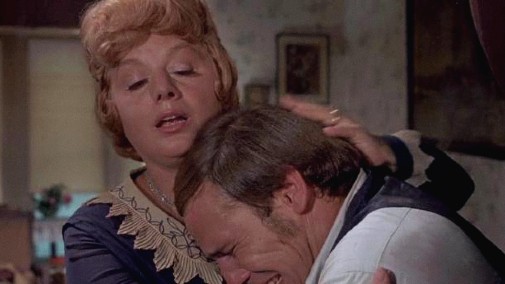
I sometimes have issues with Shelley Winters onscreen. She's a bold actress who likes to take risks and is deeply unafraid of ridicule. Yet that admirable attitude doesn't always result in good performances. Often, I find that she can invest too much in the cartoony excess of a character and forget to flesh out more grounded elements of a role. In Bloody Mama, though, she's beyond perfect. Both the actress and the director know what her strengths are and they weaponize qualities and fragilities alike, modulating the screen persona until it's an integral part of the movie. Instead of trying to squeeze Winters into his pre-existing vision, Corman seems to have built Bloody Mama around the star.
Seeing her interact with her boys is especially strange, as her open disdain dances with obsessive love, a whiff of Oedipal obsession mixed with the mercenary pragmatism of a gang leader. There's tenderness too. See her short scenes with the father of her children, a tear in her eye, and a rueful mask hiding disappointment. Or, better yet, the many instances when Ma Barker consoles a crying son by drawing the weeping murderer to her bosom. All of this coalesces into one of the creepiest portraits of maternal devotion Hollywood has ever produced, and that's not even factoring in the fearless ways in which Winters plays Barker's criminal activities. For example, the actress has never been more chilling than when Ma Barker emotionlessly drowns a poor woman her boys had kidnapped.
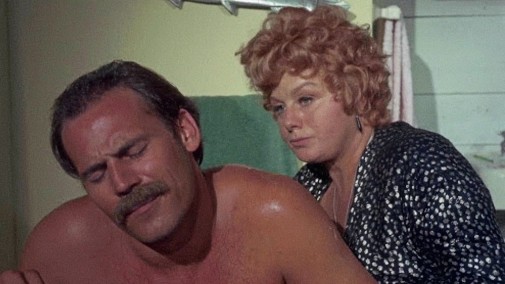
Winters won her Oscars for supporting roles, but she should have been a contender for the Best Actress statuette back in 1970. If I had any doubts about the matter, they were quickly dispelled once Bloody Mama entered its last and cruelest act. When one of her beloved sons (played by a young Robert De Niro) dies, Ma Barker starts imploding before our eyes. Still speaking with her heavy accent, each word coated in sticky molasses, the woman unravels in paroxysms of grief-stricken vulgarity. It's both garish and heartbreaking, delicious and foul, like a ripe fruit that's so sweet we can practically taste the rot blooming in the sugary flesh. In her last moments, the actress delivers the most multifaceted performance of her career, fully surrendering herself to the anguish that spews out of Ma Barker's heart as the Angel of Death approaches.
In Bloody Mama, Shelley Winters is a force of nature!
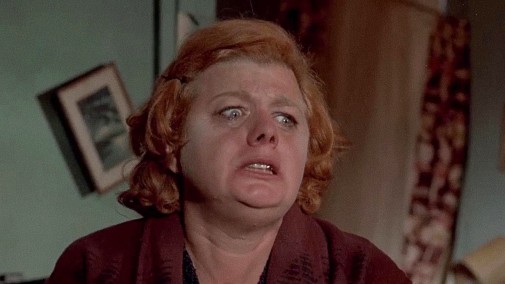
Thank you for attending TFE's Shelley Winters Centennial!
Nathaniel on The Starlet in A Double Life (1947)
Eric on The Pro in Lolita (1962)
Nathaniel on The Champ in A Patch of Blue (1965)
Claudio on The Actor's Actor Bloody Mama (1970)
Baby Clyde on The Old Crone Pete's Dragon (1977)
Glenn Dunks on The Memoirist "Shelley II" (1989)



Reader Comments (15)
Off topic, but this role would've come after her 'Ma Barker' appearances on the Batman TV show.
-By accident, I stumbled upon a youtube clip of her on the Johnny Carson show where she ends up pouring a cup of water (or gin?) over Oliver Reed's head. He was the 2nd guest and was getting quite irritating with Shelly interrupting and turning the conversation back to her. She leaves after about 10 minutes, only to return and show her displeasure over something that Reed said.
Winters was a force of nature. Not a good one. Never watch her TV interviews. She is mean spirited and too into herself. Too bad b/c she was a good actress
I can't say I'm as enamored of this particular performance as you are. It's fun and florid but a trifle too big to be taken seriously. Shelley fully commits to the role but we've entered the period where unless a very strong director sat on her she often threw restraint to the wind.
I don't see Shelley Winters as mean spirited.
Winters was familiar with the fledgling work of Robert De Niro at the Actor's Studio. She insisted in the production company casting the struggling actor as the doomed son, Lloyd Barker. De Niro talks about appearing Bloody Mama and not making enough money. He reports how Winters gave him pocket money so he would be able to have lunch.
Later in his career De Niro advocated for Winters to play his mother in Awakenings. The casting director insisted on an audition. Winters was offended and brought her two Oscars to the meeting. She reportedly unpacked them, said that some people thought she could act, and abruptly left.
This were she started to congeal and become comic.
Yes! This is my favorite Shelley Winters performance. I know Bloody Mama can be unnervingly garish at times, but I marvel at Winters‘ ability to play Ma Barker as a bundle of neuroses and perversities without skimping on psychological nuance. Also, that opening scene is utterly haunting in its construction. Kudos to editor Eve Newman and cinematographer John A. Alonzo (Chinatown, Scarface, Sounder), who works wonders with natural light here.
Claudio - i wish i liked this performance as much as you but it seems we're opposites with Shelley :) as I LOVE her in A Patch of Blue but think she's too much here. That said, her "too much" is always riveting and I admire this go-for-broke performances, spittle and all.
NATHANIEL R -- We both like her in DOUBLE LIFE at the very least :)
It's interesting to see what's too much for some people and how that varies. To me, A PATCH OF BLUE is far too much, but BLOODY MAMA is just right. That being said, after reading your write-up, I'm eager to revisit the 1965 picture. Maybe I'll have a change of heart.
I'm on Team Nathaniel - forever.
Nathaniel, please do not use the word "that" in referring to a person. Use the word "who". Winters is not "an actress that likes to take risks", but rather she is "an actress who likes to take risks".
Michael -- this article is by Claudio and English is his second language (and he's a remarkable writer in both languages) but I should have caught it in editing so yes, my fault. But hope you enjoyed the piece!
Please, please, please tell me we're gonna talk about Whoever Slew Auntie Roo and What's the Matter with Helen!
Excuse you @Michael, “that” can be used to refer to either person or things. When the adjective clause is integral to the meaning of the whole sentence, we uses “that” to begin said clause.
@Nathaniel you should not apologize for that non-mistake. Claudio, you did a great job!
Sometimes, people who use English as their second language about grammar than native speakers. End of rant.
Yep, Claudio is a very remarkable writer, especially considering the second language factor. Anyway this is for me Winters’ non-plus-ultra-role and one the most interesting achievements by genius Corman
I hate it when someone corrects another on their spelling or syntax.